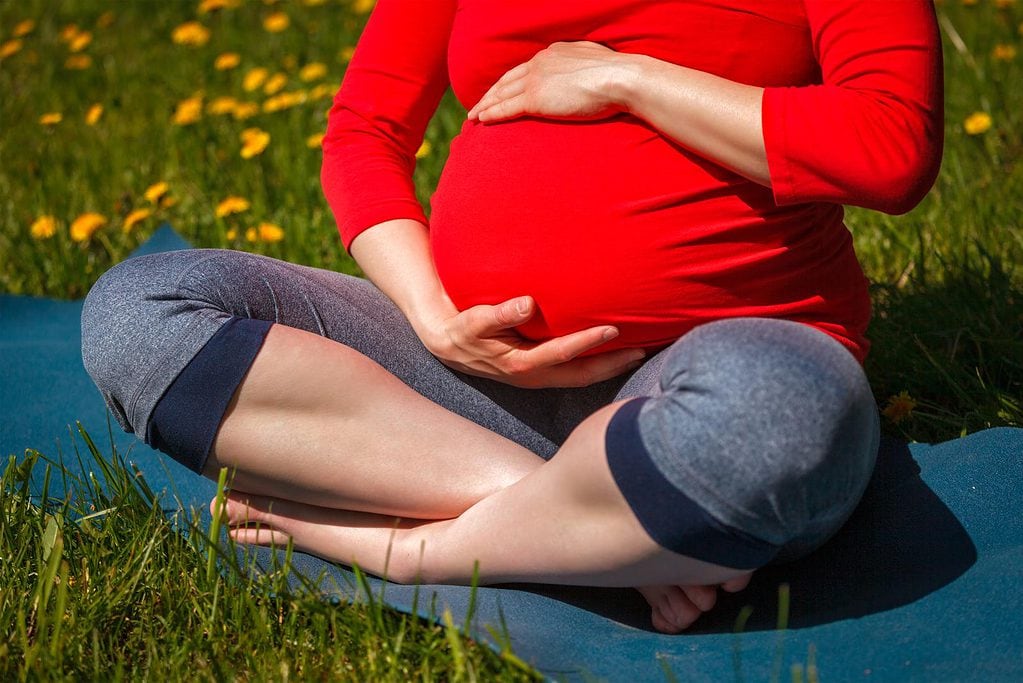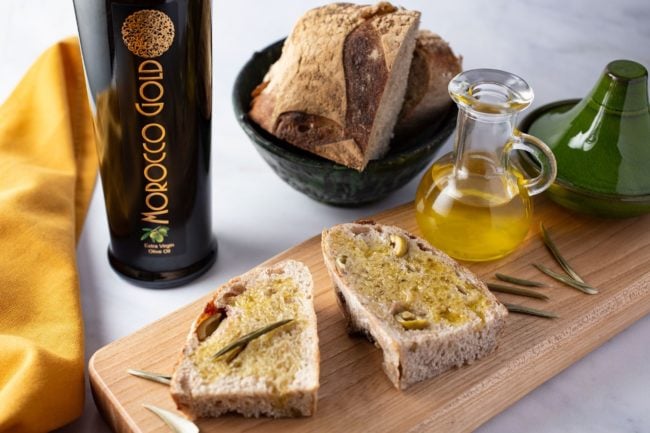Mediterranean Diet Can Help Women With Polycystic Ovary Syndrome
Updated 26th October 2022

Contents :
- Trials link Mediterranean Diet With Reduction in Obesity related PCOS
- Extra Virgin Olive Oil Can Reduce Inflammation Associated with PCOS
- How A Mediterranean Diet Rich In Extra Virgin Olive Oil Can Help With Reproductive Health
- What Is The Best Olive Oil To Buy?
- Why Is Nutrition Important For Fertility?
- Is Extra Virgin Olive Oil Safe During Pregnancy?
- Benefits Of Extra Virgin Olive Oil For Pregnant Women
- In Summary
Trials link Mediterranean Diet With Reduction in Obesity related PCOS
Following a low carbohydrate diet such as The Mediterranean Diet can be an effective PCOS treatment for women who are overweight, according to a recent report in The Globe and Mail
According to a 2021 review of 20 randomized controlled trials, low-carbohydrate and low-glycemic-index diets, as well as the DASH and Mediterranean diets, improved fertility and reduced androgen levels in women with PCOS.
Trial researchers found that low-carbohydrate diets (about 40 per cent of daily calories from carbohydrate) tended to be better for optimizing ovulation, improving pregnancy rate and reducing the risk of miscarriage.
The 12-week study compared two calorie-restricted diets and found that a Mediterranean diet with 20 per cent carbohydrate calories was superior to a low-fat diet for losing weight, reducing body fat, lowering blood triglycerides and improving insulin resistance. Both diets were effective at restoring the menstrual cycle.
Extra Virgin Olive Oil, Reduced Inflammation and Polycystic Ovary Syndrome
Consuming a Mediterranean diet rich in anti-inflammatory compounds from whole grains, vegetables, fruit, nuts, pulses and extra virgin olive oil can also help dampen inflammation, which is associated with PCOS.
Research shared in The Globe and Mail also found a low glycemic diet to be helpful at reducing androgen levels, improving ovulation and decreasing insulin resistance. Foods with a low glycemic index, like fibre-rich whole grains, are digested more slowly and help control insulin levels.

How A Mediterranean Diet Rich In Extra Virgin Olive Oil Can Help With Reproductive Health
Countless studies support the benefits of maintaining a healthy diet throughout pregnancy but did you know that a vast body of research suggests The Mediterranean Diet can help with fertility and conception?
In fact, The Mediterranean Diet – with its emphasis on vegetables, grains, fish and healthy fats such as the best quality extra virgin olive oil – can help with all stages of reproductive health from conception to pregnancy and beyond.
Dietician and Blogger Melanie McGrice, explains that extra virgin olive oil has 5 key features which makes it her ‘favourite oil to use when you’re trying to get pregnant’. She looks for oils that are:
- Low in bad saturated fats which can cause inflammation.
- Rich in antioxidants which can protect our eggs from damage.
- High in vitamin E which is a fat-soluble vitamin that has been found to be good for our uterine lining.
- Abundant in good monosaturated fats which have been found to decrease inflammation.
- Plentiful in omega 3 fats, which have been found to increase blood flow to our uterus and improve fertility hormones.
Melanie says that Extra Virgin Olive Oil is low in bad saturated fats, rich in antioxidants and rich in vitamin E, it contains some omega 3 fats and has a high proportion of monosaturated fats.
It’s not surprising that it gets her number 1 vote!
Fertility and pregnancy expert Emma Cannon agrees that good nutrition is of vital importance in improve your chances of conception.
Emma said: “There is increasing evidence that fertility can be improved through good nutrition; of particular note are omega-3, antioxidants and plant sources of protein.”
What Is The Best Olive Oil To Buy?

It is important to ensure you buy the right Extra Virgin Olive Oil to ensure the highest possible quantity of these fabulous fertility boosting antioxidants in every drizzle.
But beware! – not all olive oil is the same. There are different grades of olive oil and associated standards are defined by the International Olive Council.
Extra virgin olive oil is the highest quality, best extra virgin olive oil you can get. To qualify as extra virgin olive oil, it is an olive oil of less than 0.8% acidity and has no taste defects. In practice, the very best extra virgin olive oils have acidity levels much lower. Morocco Gold extra virgin olive oil is consistently below 0.5%, normally around 0.25% to 0.3% depending on the weather conditions throughout the growing season.
Why Is Nutrition Important For Fertility?
According to the Olive Wellness Institute, nutrition can impact the health of the egg, the health of the sperm, the production of fertility hormones which impact the timing of ovulation, the health of the uterus (and consequently the likelihood of implantation), and the growth and development of the foetus.
There are 4 key stages of support that nutrition intervention is required.
- Try To Conceive
- Dietary Conditions
- Assisted Reproductive Treatments
- IVF
Trying To Conceive
The first stage is couples who have just started trying to conceive. The key message for couples who are trying to conceive is the impact of nutrition to shape their baby’s future. Research suggests that preconception nutrition can influence genetic programming to impact a child’s future weight, risk of chronic diseases and cognitive abilities.
For example, a study by Dr Petry and colleagues suggests that pre-conception maternal and paternal lipid intake may impact genetic printing to influence the child’s future development and metabolism. Furthermore, a Mediterranean-style diet and monounsaturated fat intake during pregnancy has been linked to decreased cardiovascular disease risk for the baby later on in life.
Dietary conditions During Pregnancy
Stage two is for couples with pre-existing or newly diagnosed dietary conditions which increase the risk of infertility. Conditions include Poly Cystic Ovarian Syndrome, Endometriosis, Insulin Resistance, Inflammatory Bowel Disease, Thyroid conditions and more. Couples with dietary conditions need to be counselled that optimal dietary management may assist in improving fertility outcomes. For example, studies suggest that endometriosis may be improved with an anti-inflammatory type diet. Extra Virgin olive oil has been found to be beneficial for immune-inflammatory diseases such as Rheumatoid Arthritis and Inflammatory Bowel Disease and may also play a protective role in endometriosis.
Current studies suggest that a Mediterranean-diet style may be beneficial for clients with Poly Cystic Ovarian Syndrome.
Assisted Reproductive Treatments
The third stage of couples requiring nutrition intervention are those undergoing Assisted Reproductive Treatments (ART). ART includes a range of procedures such as ovulation induction for women who aren’t ovulating regularly, and artificial insemination, where semen is transferred directly into a woman’s uterus. Before moving onto In Vitro Fertilisation, solving problems utilising diet and lifestyle should be considered. For example, around 30% of fertility problems arise from male sperm health. Studies suggest that Extra Virgin olive oil may help to improve semen quality and sperm functionality which may improve ART outcomes.
Secondly, optimal egg health is essential for successful Assisted Reproductive Treatments (ART). Inflammation in the fluid surrounding the egg impacts egg quality and decreases the chance of conception. Studies show that Extra Virgin olive oil helps to minimise inflammation.
Thirdly, approximately half of all embryo implantations result in failed pregnancy. Although this can be caused by the health of the embryo, uterine receptivity is also an important factor.
Women require a thick uterine lining of at least 7milimeters for implantation. Studies suggest that vitamin E supplements may help to increase the thickness of the uterine lining, although the mechanism for this remains unknown. Extra Virgin olive oil is a rich dietary source of vitamin E, and although no studies have been conducted, it is plausible that the vitamin E in Extra Virgin olive oil may be one of the factors contributing to its benefit in women who are trying to conceive. Aspirin is often given to reduce inflammation. Studies show that Extra Virgin olive oil has significant anti-inflammatory effects.
In Vitro Fertilisation
Lastly, the final stage of nutrition intervention is for couples undergoing In Vitro Fertilisation (IVF). IVF literally means ‘fertilisation in a test tube’. The embryo is then transferred into the woman’s uterus. Studies suggest that adherence to a Mediterranean-style diet, including the use of Extra Virgin olive oil may strengthen IVF outcomes. For example a study by Dr Vujkovic and colleagues found that women consuming a more Mediterranean-style diet were more likely to become pregnant through IVF than those consuming a more ‘health conscious’ dietary style which was lower in healthy oils and legumes. In conclusion these results were substantiated by Dr Karayiannis and colleagues who found that a 5 point increase in the Mediterranean Diet Score resulted in a 2.7 times higher likelihood of pregnancy through IVF.
Furthermore, a diet high in Extra Virgin olive oil and fish, and low in meat, was found to improve embryonic growth and minimise risk of miscarriages.
In summary, current research suggests that Extra Virgin olive oil may be beneficial for fertility whether couples are trying to conceive naturally, have dietary conditions which may impact their fertility, are undergoing Assisted Reproductive Treatments or In Vitro Fertilisation.
Is Extra Virgin Olive Oil Safe During Pregnancy?
Before you add extra virgin olive oil to your pregnancy diet, you should know whether it is safe for you or not. Well, extra virgin olive oil is very safe for you to consume during your pregnancy and, thus, you may safely add it to your pregnancy diet. It has many benefits for a pregnant woman. In fact, it is not only good for the to-be-mommy but it also has immense benefits for the unborn baby too.
Benefits Of Extra Virgin Olive Oil For Pregnant Women
A recent study, published in The American Journal of Clinical Nutrition suggests that the children of mothers who eat a diet rich in inflammatory foods including sugars, artificial trans fats and processed meats will experience greater weight gain between the ages of three and ten years.
The findings of this latest research add weight to previous understanding that weight gain problems may begin in pregnancy as pathways that program metabolism and patterns of eating are sensitive to in utero influences.
Among the recommendations from the research team is that pregnant women consider a Mediterranean Diet, high in plant-based foods, including extra virgin olive oil, fish and unsaturated fats to benefit both mother and child’s health. These foods provide important sources of vitamin D, omega-3 polyunsaturated fatty acids, and other nutrients that have been shown to be beneficial for offspring health.
In their study, Author Carmen Monthé-Drèze and colleagues analysed data on 1,459 mother-child pairs collected by Project Viva — an ongoing study into maternal and child health being conducted at the Harvard Pilgrim Health Care Institute in Massachusetts.
During their respective pregnancies, each mother was asked to complete questionnaires on their dietary intake, which the researchers interpreted through the lens of three different dietary indices. These included the Dietary Inflammatory Index, the Mediterranean diet score, and the Alternate Healthy Eating Index for Pregnancy.
After giving birth, each child was weighed and measured several times between birth and adolescence, from which body mass index (BMI) values were calculated. Finally, the researchers analysed how each mother’s dietary index scores were associated with their offspring’s growth trajectory.
“Maternal nutrition during pregnancy may have a long-term impact on children’s weight trajectories,” said Dr Monthé-Drèze. She added that the findings suggest “there are specific developmental periods when nutrition during pregnancy may influence offspring growth. We found that a pregnancy diet with higher inflammatory potential was associated with faster BMI growth rates in children between three and ten years of age.” She added “We also found that lower adherence to a Mediterranean-style diet during pregnancy was associated with higher BMI trajectories through adolescence.”
Researchers also revealed that, of those taking part in the study, mothers who more closely followed an anti-inflammatory diet including extra virgin olive oil, were also more likely to be well-educated, have a higher income, and less likely to smoke or have obesity themselves. As reported in Insider, this is likely due to the fact that financial and social resources impact dietary health and consistent access to healthy food makes a difference in preventing obesity.
Olives are power-packed with various health benefits. Apart from being rich in dietary fiber, olives are a rich source of monounsaturated fats, vitamin E, and iron. Extra virgin olive oil is very gentle on the stomach and, thus, very safe for consumption during pregnancy. Here’s how it helps you and your unborn baby during pregnancy.
Vitamin E:
Olive oil may not be a high source of vitamin E. However, because of its resistance to oxidation, the quantity present offers ample benefits to a pregnant woman. Vitamin E is one of the components that help your baby to adapt better in the oxygen-filled environment, soon after birth. If the mother of a premature or preterm baby consumes olive oil during the breastfeeding stage, it may help her baby to develop better.

Beneficial in Foetal Development:
If you consume olive oil during pregnancy it may greatly benefit the growth and development of your unborn baby. The substantial amounts of omega-3 fatty acids are extremely beneficial for your baby’s heart. It has also been observed that consumption of olive oil during pregnancy improves brain function and development and it also improves the learning skills of your baby, as he grows. Also, if a mother consumes olive oil on a regular basis during her pregnancy, it may positively impact the height and weight of her unborn baby.
Helps in Reducing Stretch Marks During Pregnancy:
Developing stretch marks is a very common phenomenon during pregnancy and most women may experience it. This may happen because as your baby grows, your pelvic muscles and abdomen stretch to accommodate your growing baby, which in turn may lead to stretch marks. Olive oil has been in use for a long time to overcome the problem of stretch marks during pregnancy. If you keep applying olive oil on your tummy area every day, it is possible that you may not have stretch marks during pregnancy. And even if you do develop stretch marks, they may either become light or in some cases, even disappear after regular usage. However, the only mantra that you need to follow while using olive oil for stretch marks during pregnancy is to use it on a regular basis.
Beneficial in Improving Reflexes in Babies:
It has been observed that mothers who consumed olive oil regularly during their pregnancy journey gave birth to babies who had better or improved psychomotor reflexes in comparison to women who did not consume olive oil during their pregnancy.
Helpful in Fighting Various Infections:
Pregnancy may make your immune system sluggish, and thus, may make pregnant women more susceptible to falling ill with various kinds of infections. However, including olive oil in your pregnancy diet may prove to be beneficial. This is because olive oil is a rich source of Vitamin A, which helps in building a strong immune system. This, in turn, may help in keeping various infections at bay. Also, Vitamin A is very beneficial for the eyes, and including olive oil in your pregnancy diet may not only ensure good eye-health of the would-be mother but it may also be beneficial for fetal eye development.
It is important to remember that olive oil, like any other oil, should be consumed in moderation. You may safely consume and apply olive oil on your skin during pregnancy but refrain from going overboard with its consumption and usage. In any case, we also suggest that you get a go-ahead from your doctor before doing so, especially if you’re using it for the first time. This is because every pregnancy is different and what may be beneficial and healthy for one woman may not be for the other. Thus your doctor may know what is best for you during your pregnancy.
In Summary
Current research suggests that extra virgin olive oil may be beneficial for fertility whether couples are trying to conceive naturally, have dietary conditions which may impact their fertility, are undergoing Assisted Reproductive Treatments or In Vitro Fertilisation.
Extra virgin olive oil is also a wonderful supplement to the diet during pregnancy.
Source: Benefits of Olive Oil for Pregnant Women – Willow Creek Olive
